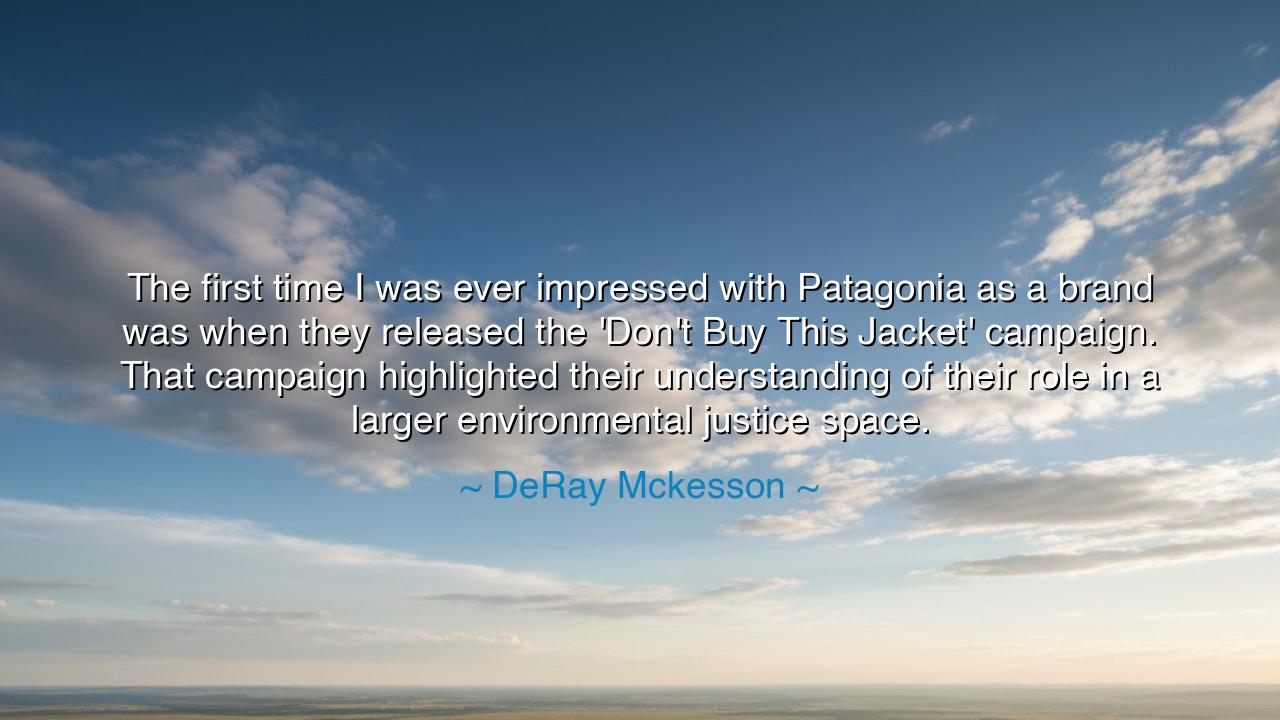
The first time I was ever impressed with Patagonia as a brand was
The first time I was ever impressed with Patagonia as a brand was when they released the 'Don't Buy This Jacket' campaign. That campaign highlighted their understanding of their role in a larger environmental justice space.






Hear the words of DeRay Mckesson, spoken with wonder at a company that chose principle over profit: “The first time I was ever impressed with Patagonia as a brand was when they released the ‘Don’t Buy This Jacket’ campaign. That campaign highlighted their understanding of their role in a larger environmental justice space.” This is not the admiration of a consumer for clever advertising, but the recognition of a deeper truth: that a brand, when guided by conscience, can use its voice not to increase desire, but to awaken restraint, and thus to serve a higher good.
The meaning of this quote rests in the paradox of the message: “Don’t Buy This Jacket.” In a world where companies clamor for more sales, more consumption, and more profit, Patagonia dared to stand apart, declaring that the truest path to sustainability was not to buy endlessly, but to consume mindfully. They admitted that every product, even their own, carries an environmental cost. To highlight this was to break the sacred illusion of commerce—that endless consumption brings happiness. Instead, they urged repair, reuse, and thoughtful stewardship of resources. Mckesson saw in this not mere marketing, but an act of moral courage, an alignment with the higher calling of environmental justice.
The origin of these words lies in the year 2011, when Patagonia launched its campaign on Black Friday, the holiest day of consumption in the modern age. While the world stampeded through stores in hunger for new goods, Patagonia placed in the New York Times a stark image of their jacket and a simple plea: “Don’t Buy This Jacket.” It was a radical act, a rebuke to mindless consumerism, and a challenge to the industry itself. Rather than chase profit, they sought to raise awareness of the earth’s fragility and humanity’s responsibility.
History itself offers a mirror to this moment. Recall the teachings of Mahatma Gandhi, who spun his own cloth as a rejection of the mindless consumption of British textiles. His act was not merely about clothing, but about justice, self-reliance, and the rejection of systems that exploit people and plunder the earth. So too did Patagonia, in their way, remind society that every purchase is a choice, every jacket carries a footprint, and every consumer holds power to either harm or heal the planet.
The lesson is carved in fire: true leadership in commerce is not found in endless growth, but in responsibility. Environmental justice demands that companies look beyond the ledger of profit and consider the ledger of the earth. For if every tree cut, every river poisoned, every garment wasted is ignored, then wealth becomes the mask of destruction. To build a just world, consumption must be tempered with mindfulness, and industries must own their place in the larger struggle for balance.
What then must we do? As citizens and consumers, we must question our own habits. Ask not only, “Do I want this?” but also, “Do I need this? What cost does this carry for the world?” Support companies that speak truth, even at the cost of their own sales. Choose repair over replacement, durability over excess, responsibility over indulgence. For in these small acts, the great tide of destruction can be slowed, and the earth given space to breathe.
Thus, let DeRay Mckesson’s words endure as both praise and summons: “The first time I was impressed was with ‘Don’t Buy This Jacket.’” Remember that admiration is not won by cleverness alone, but by courage—the courage of a company to reject the easy path of profit and choose instead the hard path of justice. Teach this to future generations: that true greatness in any field is measured not by how much you take, but by how much you protect, preserve, and pass on. For in this lies the heart of environmental justice, and the hope of the earth.






AAdministratorAdministrator
Welcome, honored guests. Please leave a comment, we will respond soon